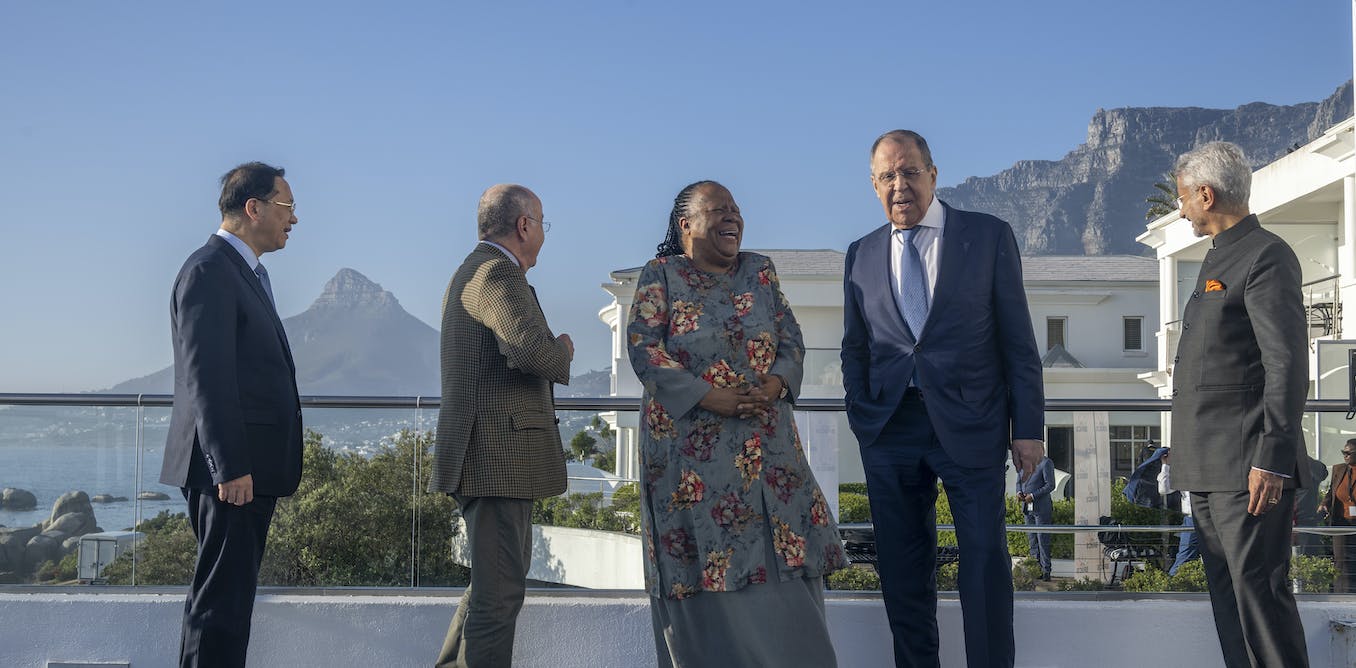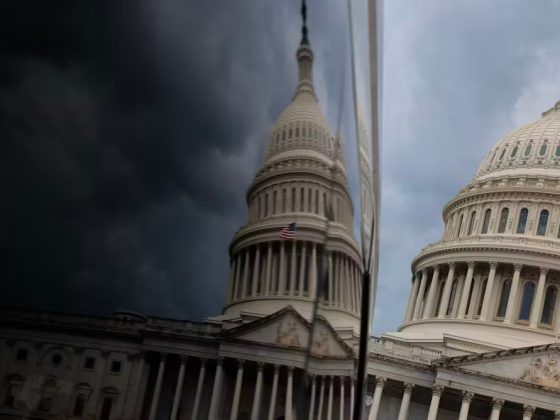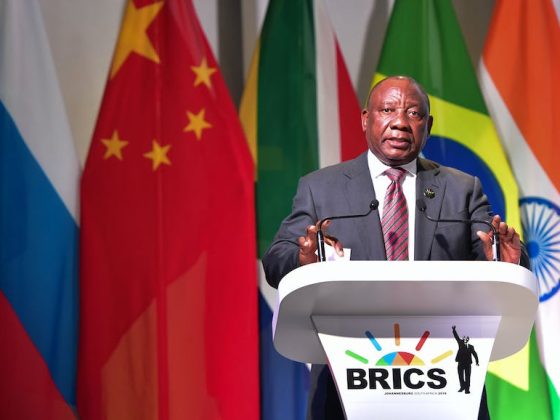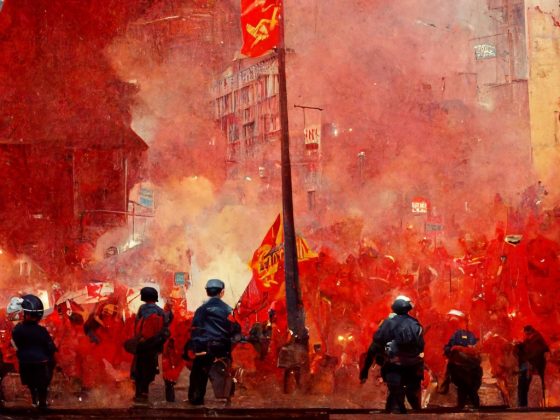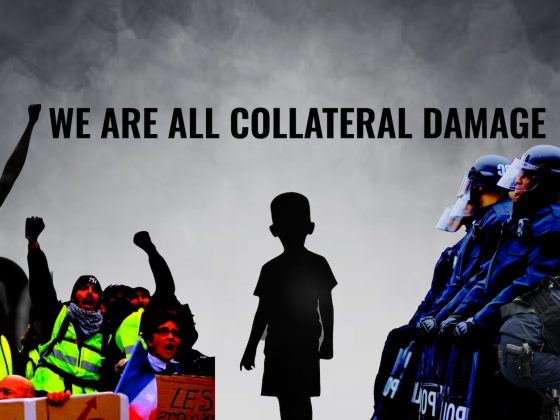Jaco Marais/Die Burger/Gallo Images via Getty Images
Mihaela Papa, Tufts University; Frank O’Donnell, Boston College, and Zhen Han, Sacred Heart University
When leaders of the BRICS group of large emerging economies – Brazil, Russia, India, China and South Africa – meet in Johannesburg for two days beginning on Aug. 22, 2023, foreign policymakers in Washington will no doubt be listening carefully.
The BRICS group has been challenging some key tenets of U.S. global leadership in recent years. On the diplomatic front, it has undermined the
White House’s strategy on Ukraine by countering the Western use of sanctions on Russia. Economically, it has sought to chip away at U.S. dominance by weakening the dollar’s role as the world’s default currency.
And now the group is looking at expanding, with 23 formal candidates. Such a move – especially if BRICS accepts Iran, Cuba or Venezuela – would likely strengthen the group’s anti-U.S. positioning.
So what can Washington expect next, and how can it respond?
Our research team at Tufts University has been working on a multiyear Rising Power Alliances project that has analyzed the evolution of BRICS and the group’s relationship with the U.S. What we have found is that the common portrayal of BRICS as a China-dominated group primarily pursuing anti-U.S. agendas is misplaced.
Rather, the BRICS countries connect around common development interests and a quest for a multipolar world order in which no single power dominates. Yet BRICS consolidation has turned the group into a potent negotiation force that now challenges Washington’s geopolitical and economic goals. Ignoring BRICS as a major policy force – something the U.S. has been prone to do in the past – is no longer an option.
Reining in the America bashing
At the dawn of BRIC cooperation in 2008 – before South Africa joined in 2010, adding an “S” – members were mindful that the group’s existence could lead to tensions with policymakers who viewed the U.S. as the world’s “indispensable nation.”
As Brazil’s former Foreign Minister Celso Amorim observed at the time, “We should promote a more democratic world order by ensuring the fullest participation of developing countries in decision-making bodies.” He saw BRIC countries “as a bridge between industrialized and developing countries for sustainable development and a more balanced international economic policy.”
While such realignments would certainly dilute U.S. power, BRIC explicitly refrained from anti-U.S. rhetoric.
After the 2009 BRIC summit, the Chinese foreign ministry clarified that BRIC cooperation should not be “directed against a third party.” Indian Foreign Secretary Shivshankar Menon had already confirmed that there would be no America bashing at BRIC and directly rejected China’s and Russia’s efforts to weaken the dollar’s dominance.
Rather, the new entity complemented existing efforts toward multipolarity – including China-Russia cooperation and the India, Brazil, South Africa trilateral dialogue. Not only was BRIC envisioned as a forum for ideas rather than ideologies, but it also planned to stay open and transparent.
BRICS alignment and tensions with the US
Today, BRICS is a formidable group – it accounts for 41% of the world’s population, 31.5% of global gross domestic product and 16% of global trade. As such, it has a lot of bargaining power if the countries act together – which they increasingly do. During the Ukraine war, Moscow’s BRICS partners have ensured Russia’s economic and diplomatic survival in the face of Western attempts to isolate Moscow. Brazil, India, China and South Africa engaged with Russia in 166 BRICS events in 2022. And some members became crucial export markets for Russia.
The group’s political development – through which it has continually added new areas of cooperation and extra “bodies” – is impressive, considering the vast differences among its members.
We designed a BRICS convergence index to measure how BRICS states converged around 47 specific policies between 2009 and 2021, ranging from economics and security to sustainable development. We found deepening convergence and cooperation across these issues and particularly around industrial development and finance.
But BRICS convergence does not necessarily lead to greater tension with the United States. Our data finds limited divergence between the joint policies of BRICS and that of the U.S. on a wide range of issues. Our research also counters the argument that BRICS is China-driven. Indeed, China has been unable to advance some key policy proposals. For example, since the 2011 BRICS summit, China has sought to establish a BRICS free trade agreement but could not get support from other states. And despite various trade coordination mechanisms in BRICS, the overall trade among BRICS remains low – only 6% of the countries’ combined trade.
However, tensions between the United States and BRICS exist, especially when BRICS turns “bloc-like” and when U.S. global interests are at stake. The turning point for this was 2015, when BRICS achieved major institutional growth under Russia’s presidency. This coincided with Moscow enhancing its pivot to China and BRICS following Western sanctions over Russia’s annexation of Crimea in 2014. Russia was eager to develop alternatives to Western-led institutional and market mechanisms it could no longer benefit from.
That said, important champions of BRICS convergence are also close strategic partners to the U.S. For example, India has played a major role in strengthening the security dimension of BRICS cooperation, championing a counter-terrorism agenda that has drawn U.S. opposition due to its vague definition of terrorist actors.
Further constraints on U.S. power may emerge from BRICS transitioning to using local currencies over the dollar and encouraging BRICS candidate countries to do the same. Meanwhile, China and Russia’s efforts to engage BRICS on outer space governance is another trend for policymakers in Washington to watch.
Toward a US BRICS Policy?
So where does a more robust – and potentially larger – BRICS leave the U.S.?
To date, U.S. policy has largely ignored BRICS as an entity. The U.S. foreign and defense policymaking apparatus is regionally oriented. In the past 20 years, it has pivoted from the Middle East to Asia and most recently to the Indo-Pacific region.
When it comes to the BRICS nations, Washington has focused on developing bilateral relations with Brazil, India and South Africa, while managing tensions with China and isolating Russia. The challenge for the Biden administration is understanding how, as a group, BRICS’ operations and institutions affect U.S. global interests.
Meanwhile, BRICS expansion raises new questions. When asked about U.S. partners such as Algeria and Egypt wanting to join BRICS, the Biden administration explained that it does not ask partners to choose between the United States and other countries.
But the international demand for joining BRICS calls for a deeper reflection on how Washington pursues foreign policy.
Designing a BRICS-focused foreign policy is an opportunity for the United States to innovate around addressing development needs. Rather than dividing countries into friendly democracies and others, a BRICS-focused policy can see the Biden administration lead on universal development issues and build development-focused, close relationships that encourage a better alignment between countries of the Global South and the United States.
It could also allow the Biden administration to deepen cooperation with India, Brazil, South Africa and some of the new BRICS candidates. Areas of focus could include issues where the BRICS countries have struggled to coordinate their policy, such as AI development and governance, energy security and global restrictions on chemical and biological weapons.
Developing a BRICS policy could help re-imagine U.S. foreign policy and ensure that the United States is well positioned in a multipolar world.![]()
Mihaela Papa, Senior Fellow, The Fletcher School, Tufts University; Frank O’Donnell, Adjunct Lecturer in the International Studies Program, Boston College, and Zhen Han, Assistant Professor of Global Studies, Sacred Heart University
This article is republished from The Conversation under a Creative Commons license. Read the original article.

